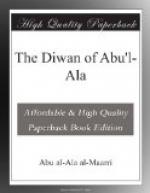EDITORIAL NOTE
The object of the Editors of this series is a very definite one. They desire above all things that, in their humble way, these books shall be the ambassadors of good-will and understanding between East and West—the old world of Thought and the new of Action. In this endeavour, and in their own sphere, they are but followers of the highest example in the land. They are confident that a deeper knowledge of the great ideals and lofty philosophy of Oriental thought may help to a revival of that true spirit of Charity which neither despises nor fears the nations of another creed and colour. Finally, in thanking press and public for the very cordial reception given to the “Wisdom of the East” Series, they wish to state that no pains have been spared to secure the best specialists for the treatment of the various subjects at hand.
L. Cranmer-Byng.
S. A. Kapadia.
Northbrook society,
158, Piccadilly, W.
INTRODUCTION TO THE DIWAN
God help him who has no nails wherewith
to scratch himself.
Arabian
proverb.
An effort has been made to render in this book some of the poems of Abu’l-Ala the Syrian, who was born 973 years after Jesus Christ and some forty-four before Omar Khayyam. But the life of such a man—his triumph over circumstance, the wisdom he achieved, his unconventionality, his opposition to revealed religion, the sincerity of his religion, his interesting friends at Baghdad and Ma’arri, the multitude of his disciples, his kindliness and cynic pessimism and the reverence which he enjoyed, the glory of his meditations, the renown of his prodigious memory, the fair renown of bending to the toil of public life, not to the laureateship they pressed upon him, but the post of being spokesman at Aleppo for the troubles of his native villagers,—the life of such a one could not be told within the space at our command; it will, with other of his poems, form the subject of a separate volume. What appears advisable is that we should devote this introduction to a commentary on the poems here translated; which we call a “diwan,” by the way, because they are selected out of all his works. A commentary on the writings of a modern poet is supposed to be superfluous, but in the days of Abu’l-Ala of Ma’arri you were held to pay the highest compliment if, and you were yourself a poet, you composed a commentary on some other poet’s work. Likewise you were held to be a thoughtful person if you gave the world a commentary on your own productions; and Abu’l-Ala did not neglect to write upon his Sikt al-Zand ("The Falling Spark of Tinder”) and his Lozum ma la Yalzam ("The Necessity of what is Unnecessary"), out of which our diwan has been chiefly made. But his elucidations




